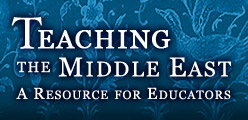Classroom Connections
Lesson Plans & Guiding Questions
LESSON 1
Women and Family in the Islamic World
Students will read selections from the Qur’an and a New York Times article on women in Islam, and speculate about why the Qur’an was revolutionary in its provisions for women when it was revealed, as well as why many parts of the Islamic world are often seen as backward in their treatment of women.
Created By: Laura Wangerin, Latin School of Chicago, Chicago, IL
Subject Area(s): History, Social Studies
For Grade Level(s): 7–10
Time Needed: 1 class period and 1 night’s homework, or ½ class period and 2 night’s homework, or two class periods.
LESSON 2
The Pact of Umar
Students will read two translations of the Pact of Umar as well as a short section of the Quran, and analyze the importance of these writings in the context of inter-ethnic or inter-religious relations in the early Islamic world.
Created By: Laura Wangerin, Latin School of Chicago, Chicago, IL
Subject Area(s): History, Religious Studies, Social Studies
For Grade Level(s): 6–10
Time Needed: One class period


 Print Page
Print Page
